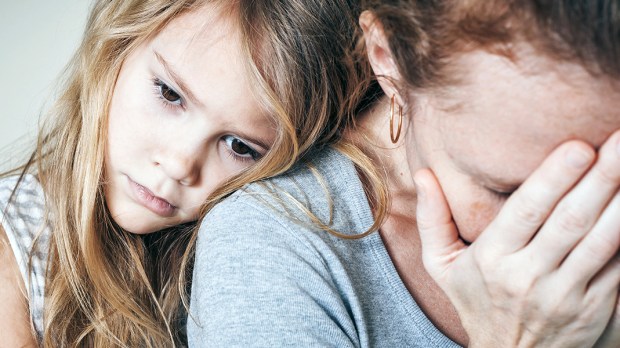How much of our emotions should we let our children see? What are we teaching them when they see us cry? Is it okay for them to see us upset or should we do it behind closed doors?
Psychologists speak of the danger of a lack of emotional intelligence in children and adolescents who never see their parents cry. What role do emotions play in our lives and what can we teach them when they see us cry?
Crying is something natural and human
Crying is in itself a natural process. It’s good for children to know that their mom or dad usually smiles, and they are happy and positive, but also that they can be sad, angry, anxious, and frustrated.
When our children see us cry, we’re giving them the opportunity to feel those difficult emotions, too. They will know that they can cry if they need to and that there’s no reason to be ashamed, to hide, or to apologize for it.
Crying doesn’t mean we’re going to suffer forever
Aside from the fact that there is more than one reason we may cry (tiredness, joy, pain), if our tears are painful, we can tell our children that although we feel sad at that time, we’ll be happy again soon. Crying is a process and not a permanent state.
Crying doesn’t mean we’re weak
Some of us were taught to block our emotions, and we were not allowed to cry. Crying scares us because it makes us look weak or we can worry about what others think, but strong people are not the ones who don’t express anything.
Being strong is not about being rigid, but about being flexible and vulnerable. We can teach our children what a strong person really is: a person who asks for help when he needs it, cries when he is sad, and laughs when he is happy.
Feelings aren’t bad
Feelings are not bad or good, but our actions can be. We can teach our children that it’s okay to feel sad when they’re not invited to a birthday party, but it’s not okay to yell at that friend at school the next day; or that it’s okay to be disappointed when a sibling doesn’t share a new toy, but it’s not okay to hit or say bad words.
Doing the right thing can be uncomfortable
Often, doing the right thing can be uncomfortable and that’s okay. Children can learn to question the status quo when a friend invites them to participate in a dangerous activity, even if that means they can be rejected by their peer group. In that circumstance, it’s best not to always follow what we feel. Seeing their parents struggle to make the right choices can be an eye opener for kids, and can be a shining example for them later on.
We can take steps to heal
There are tears that come from the harsh realities of life that they will see and feel as well. Dear ones diagnosed with diseases, family members who may have accidents or die. These things are very painful.
This is not to suggest that they wallow in pain without getting help. It’s about being able to guide them in developing the emotional capacity to experience life’s curve balls with awareness and compassion. When we go through these difficult emotions together, they will experience how their parents are ready to love and comfort them.
We always have an opportunity to love
Our children can know that their mom and dad will have many arguments over the years, but that there’s a lot of love behind the frustrations. They can learn that healthy dialogue and healing reparation come with thoughtful communication and lots of hugs. We can teach them that they will always have the opportunity to connect and accompany, to give and receive a comforting hug.
You can move forward with the difficulties
Tears are often our triggers to act, vote, say no, change careers, etc. So accepting these difficult moments, welcoming them, and recognizing that we need them can help us thrive. We can teach them that they can get up after a fall, pick up where they left off, and make reparation when a relationship needs love.
We can connect internally to find answers
Tears have value because they come from the fact that we are in touch with our own truth. Jesus himself wept for a friend in front of the people. We can teach them that they can cry without anyone telling them not to do so, that by connecting internally they do not need to look outside for other ways to feel they are alive.
We can avoid disease
Studies prove that crying is healthy and necessary — it’s like a stress relief valve and can prevent health problems and future disorders. Insofar as adults connect with their emotions, children will do so naturally. But if we don’t, it will be very difficult for them to do it.

Read more:
Good parenting doesn’t have to be so stressful

Read more:
Common parenting ‘mistakes’ that are actually brilliant child-rearing techniques

